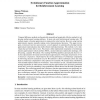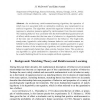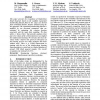176 search results - page 13 / 36 » Optimal Sample Selection for Batch-mode Reinforcement Learni... |
ICML
2009
IEEE
14 years 8 months ago
2009
IEEE
We consider the task of reinforcement learning with linear value function approximation. Temporal difference algorithms, and in particular the Least-Squares Temporal Difference (L...
CORR
2010
Springer
13 years 7 months ago
2010
Springer
Temporal difference methods are theoretically grounded and empirically effective methods for addressing reinforcement learning problems. In most real-world reinforcement learning ...
GECCO
2010
Springer
13 years 11 months ago
2010
Springer
Shaping functions can be used in multi-task reinforcement learning (RL) to incorporate knowledge from previously experienced tasks to speed up learning on a new task. So far, rese...
ECAL
2005
Springer
14 years 1 months ago
2005
Springer
An evolutionary reinforcement-learning algorithm, the operation of which was not associated with an optimality condition, was instantiated in an artificial organism. The algorithm ...
ITNG
2007
IEEE
14 years 2 months ago
2007
IEEE
This paper presents the recognition of Handwritten Hindi Numerals based on the modified exponential membership function fitted to the fuzzy sets derived from normalized distance f...



